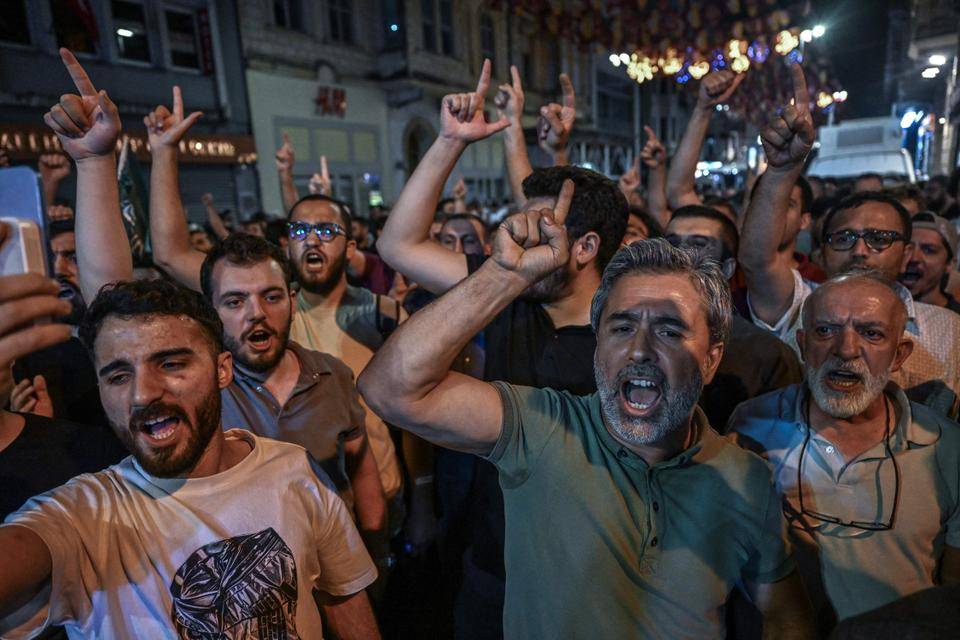Tempers and Tear Gas: Istanbul Erupts Over Outrage at Satirical Cartoon
What began as a provocative piece of satire has escalated into full-blown unrest in Istanbul: clashes, mass arrests, and a fierce national debate over the limits of expression. The spark? A cartoon published in the satirical weekly LeMan that many interpreted as depicting the Prophet Muhammad—a highly forbidden act in Islamic tradition.
On June 26, LeMan printed a black-and-white drawing showing two winged figures with halos—one saying, “Salam aleikum, I’m Mohammed,†the other replying, “Aleikum salam, I’m Musaâ€â€”above a city under bombardment . While the magazine claims the figures represent a generic “Muslim man†named Muhammad and the prophet Moses—symbolizing religious solidarity amid violence—the image was widely interpreted as depicting sacred figures, triggering uproar online and offline .
On June 30, Istanbul’s chief prosecutor launched a criminal investigation for “publicly insulting religious values,†issuing arrest warrants for the magazine’s top editorial staff .
Interior Minister Ali Yerlikaya confirmed that police detained the cartoonist (initials D.P.) and later three more LeMan staff—editor‑in‑chief Zafer Aknar, graphic designer Cebrail Okcu, and manager Ali Yavuz . Videos circulated showing them being handcuffed and carried from their homes .
Justice Minister Yılmaz Tunç emphasized that no freedom of expression excused insulting religious beliefs: “No freedom allows mocking a religion’s sacred values in such an offensive manner†. The criminal investigation falls under Article 216 of the Penal Code, which punishes disparaging religious values . The magazine and public communications director Fahrettin Altun labeled the cartoon “immoral†and denounced what they called a deliberate provocation .
Hundreds stormed the magazine’s Istiklal Street office, chanting slogans like “Kemalist infidels will be held accountable†. They also attacked a nearby bar frequented by LeMan staff, chanting, “For our Prophet, we would give our lives†. Riot police used rubber bullets and tear gas to disperse crowds of 250–300 protesters .
Interior Minister Yerlikaya warned that those behind the “vile drawing†would be held accountable . Istanbul Governor Davut Gul also condemned the act, saying such provocations threaten national faith and unity . The chaotic scene marked a dramatic flashpoint in Turkey’s ongoing struggle over freedom of expression.
LeMan issued a statement apologizing to readers who felt hurt, insisting the cartoonist aimed “to portray the righteousness of the oppressed Muslim people,†not to mock sacred values . Aknar, from Paris, denied any depiction of the Prophet Muhammad. He said the name was commonplace across the Muslim world and insisted the cartoon targeted human suffering amid Israeli strikes . He also drew parallels with France’s 2015 Charlie Hebdo attacks—warning the situation in Istanbul might ignite a similar confrontation .
The investigation under Article 216 empowers authorities to prosecute those accused of insulting religious values. While LeMan defends its work under freedom of expression, the swift legal response reflects a secular legal system that still prioritizes social harmony over provocative satire .
Authorities have confiscated the issue and blocked LeMan’s website and social media handles . Arrest warrants remain outstanding for magazine figures believed to be abroad .
This incident is emblematic of Turkey’s precarious balance between secular freedoms and religious sensitivities. While the state maintains secularism in law, its public sphere remains deeply influenced by devout Islamic sentiment. Cartoonists and satirists face repeated pressure—LeMan itself has faced legal challenges over politically sensitive content before .
The Charlie Hebdo attacks and Jyllands‑Posten controversy in Europe underscore the potential of satire to inflame global tensions . Turkish officials highlighted these parallels, warning that LeMan’s cartoon risked provoking religious discord domestically .
As LeMan staff face legal proceedings, Turkey finds itself caught between preserving freedom of expression and maintaining public harmony. Protesters insist on protecting sacred values; cartoonists assert that satire remains vital—even if provocative.
The detained include the primary cartoonist and senior editorial staff. Investigations are ongoing, with the issue pulled from distribution and digital content disabled . Additional arrests and charges under religious defamation laws are expected as Turkish courts assess the case.
1. Social fault line: A satirical cartoon triggered a national crisis, dividing Turkish society into free-speech advocates and religion-first defenders.
2. Secular law, religious climate: Though Turkey is legally secular, religious sentiment exerts powerful influence over public morality.
3. Escalation risk: Authorities view the incident not just as media offense but as a potential spark for broader unrest.
4. Media under scrutiny: This case highlights repeated legal crackdowns on satire and the fragile space for dissent in Turkish media.
5. Global resonance: With echoes of past religious controversies abroad, the event underscores how provocative satire can transcend national borders.




No comments yet
Be the first to share your thoughts!